"TOMMY" WILSON WAS BORN IN STAUNTION, VIRGINIA, IN 1856. THE FOLLOWING YEAR HIS PARENTS MOVED TO AUGUSTA, GEORGIA. IN 1874, "TOMMY" ENROLLED IN A PRESBYTERIAN COLLEGE IN WILMINGTON, NORTH CAROLINA. AFTER 1 YEAR HE RETURNED HOME DUE TO AN "ILLNESS." THE FOLLOWING YEAR, AS WOODROW WILSON, THE DIXIE DOUBLE ENROLLED IN PRINCETON COLLEGE IN NEW JERSEY. "PROFESSOR" WILSON WAS "NUTS" ABOUT THE NUMBER 13, AND THE DIXIE DOUBLE LEFT HIS SOUTHERN ACCENT IN DIXIELAND!! |
As in the case of the Joseph Stalin double, only the Almighty and the Jacobite British Secret Service knows the true identity of the "Dixie double," but they are not about to share that top secret info with the world...
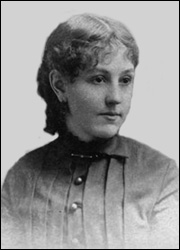 Ellen Louise Axson. Future spouse of Woodrow Wilson. |
|
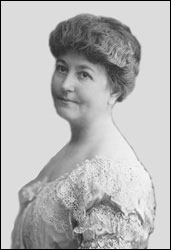 Ellen Louise Wilson (May 15, 1860 – August 14, 1914). |
As a devout Christian, Ellen was a sheep married to a wolf, and he never shared his Dixie double background with her....The couple had 3 children: Margaret, Jessie, and Eleanor.
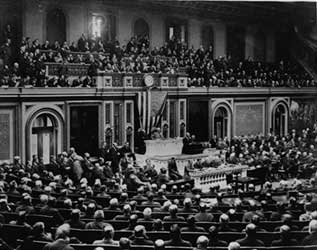 Wilson asking Congress for a Wilson asking Congress for a declaration of war, April 2, 1917. |
|
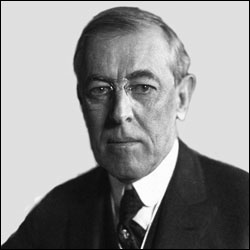 Woodrow Wilson (d. Feb. 3, 1924). President from March 4, 1913, to March 4, 1921. |
He viewed the Tsar's abdication as a golden opportunity to intervene militarily in Orthodox Russia!
Both parents of "Tommy" Wilson were British Secret Service agents. Joseph Ruggles Wilson was the son of immigrants from Northern Ireland and his wife was born in Britain.
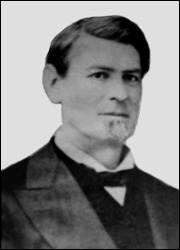 "Rev." Joseph Ruggles Wilson (1822–1903). |
|
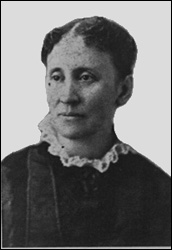
Janet Woodrow Wilson
(1826–1884). |
No plausible reason exists why "Tommy" Wilson suddenly left Davidson College in Wilmington, North Carolina. He could have died of "natural causes," or his parents could have arranged to have him sent to "Presbyterian heaven."
 "Tommy" Wilson (1856–1875) aged 16. |
|
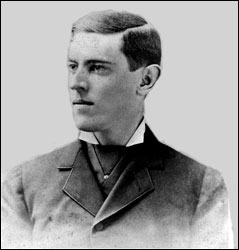 A photo of Wilson taken in 1875. He was about 7 years older than "Tommy." |
Here is a quote from a biography of Wilson written in 1924:
The Truth is that, although the South impressed itself deeply upon the Wilsonian heart, the externals of the South rested rather easily upon the Wilsons. Woodrow Wilson, born and reared in the South, never betrayed his Southern training by his speech. In college, one of his classmates declares that he never realized Wilson's Southern birth until years after his classmate left school he read Wilson's tribute to Lee in his history of the United States. (White, Woodrow Wilson: the Man, his Times, and his Task, p. 73).
If a person claims to be born and raised in New York City and yet speaks with a French accent you know that he/she is wearing a mask!
 Wilson as a student at Princeton, bottom row, second from right. |
|
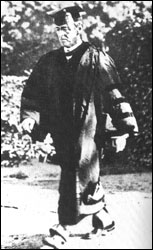 Wilson in his "monkey suit" as president of Princeton. |
Here is a quote from a massive 2013 biography of Wolfson by a Princeton University graduate:
For all his towering intellect and abiding faith, Woodrow Wilson was superstitious—especially about the number thirteen, which he considered talismanic. His first and last names comprised thirteen letters. In his thirteenth year of service at Princeton at became the college's thirteenth president. In 1913 he became President of the United States, whose thirteen original colonies received tribute everywhere in the symbols of the nation, from the numbers of stripes on its flag to the number of talons in the eagle's sinister talons on the national shield. Those close to the President knew that he had selected the date of the George Washington's departure so that it would arrive in France on December 13. (Berg, Wilson, pp. 12-13).
Wilson was the driving force behind turning Princeton College into Princeton University, but his favorite subject of ASTROLOGY was not added to the curriculum.
General Marlborough Churchill was head of U.S. military intelligence during WWI
With a name like Marlborough Churchill you might as well have "Kaiser Bill," or Winston Churchill, in the White House!
World War I was the first industrial war with killing on a massive scale. It was also the first war that encrypted messages were transmitted via cable or wireless. Britannia was the most advanced nation in cryptology, with experience dating back over 400 years.
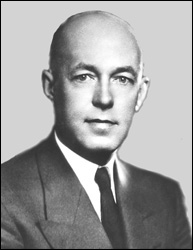 Herbert O. Yardley (1886–1958). |
|
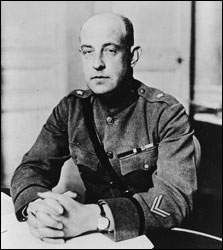 General Marlborough Churchill (1878–1947). |
Yardley was brilliant but naive. It never occurred to him that General Churchill was in communication with his namesake in London. Here is his account of a top secret meeting with a French intelligence officer:
In this regard I recall the case of a French liaison officer who delivered a secret lecture before our Military Intelligence Division. Every precaution was taken to keep the meeting secret from any persons save those who were admitted by virtue of their respective positions of responsibility. Only a small group heard the lecture and they were intelligence officers. The doors of the rooms were locked and bolted; guards were stationed outside so that no one could listen or come near the room. In his talk the liaison officer gave in great detail, for the instruction of our Intelligence section, and account of the French positive espionage in Germany, recounting activities of French spies in enemy territory. (Yardley, The American Black Chamber, p. 80).
Just 48 hours after delivering his lecture, that intelligence officer was recalled to France to explain his indiscretion. General Churchill made sure that the top secret military intelligence reached the Boche via Churchill in London, and many of the French agents in Germany were arrested and shot.
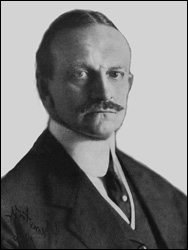 Johann von Bernstorff (1862-1939). German amb. from 1908 to 1917. |
|
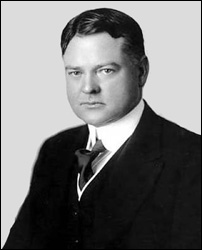
Herbert Hoover (1874–1964) fed the
Boche from Belgium during the war. |
Incredibly, Herbert Hoover was elected President in 1928, and he engineered the Great Depression the following year because Alcohol Smith lost the election!
Wilson was delighted when the "Bolsheviks" seized power in Russia!
Wilson could not have chosen a more inept secretary of "war" as Newton D. Baker. Baker had absolutely no military background or training. He was so short that visitors could barely see him behind his desk in the "War" Office.
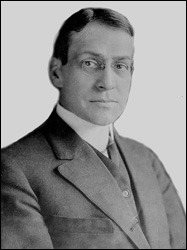 Newton D. Baker (1871–1937). Sec. of "War" from 1916 to 1921. |
|
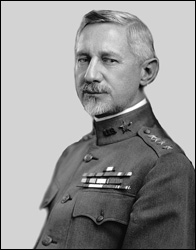 General Peyton C. March (1864–1955). |
March was "excited" by the Red Revolution in Russia and he was very anxious to send the Doughboys to fight the "Bolsheviks."
British Field Marshall Sir Henry Wilson was awestruck by the Doughboys' prowess in battle, but he wanted them fighting his "Bolsheviks" . . . instead of the fanatical soldiers of the Second Reich.
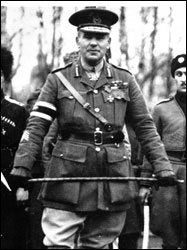 General Frederick Poole (1869–1936). |
|
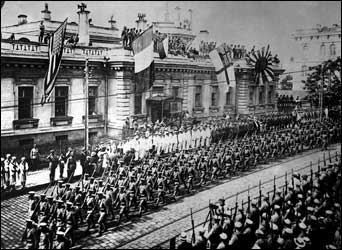
Thousands of U.S. soldiers marching in
Vladivostok, Siberia, Sept. 1918. |
Under General William Sidney Graves (1865–1940) March also sent a division to Vladivostok in Siberia. As usual, their mission was to fight the "Bolsheviks."
The Japanese also had a huge military presence in Siberia. Wilson wanted the war in Europe to last until 1919 so he could have time to send more troops to Russia. He was very disappointed when the war ended on November 11, 1918.
The U.S. intervention in Russia was a great boon to the British Bolsheviks as it helped to consolidate their power.
The U.S. Senate killed Wilson's deadly League of Nations Treaty!!
Wolfson arrived for the Paris Peace Conference on December 13, 1918.
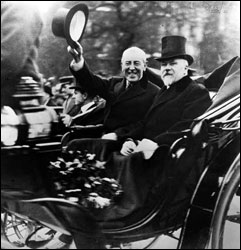 Wilson acknowledging the accolades of the Parisians, Dec, 14, 1918. |
|
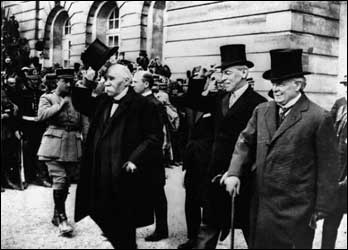 Wilson in Paris with Prime Ministers Wilson in Paris with Prime Ministers Clemenenceau and David Lloyd George. |
That was the only reason he traveled to Paris. He never visited a single grave of the brave men who saved Christian civilization from the Second Reich.
 Robert Lansing (1864–1928). Sec. of State from 1915 to 1920. |
|
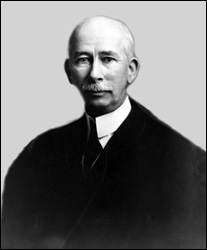 "Colonel" Edward House "Colonel" Edward House(1858–1938). |
During the 6 months he spent in Paris, Wolfson consulted with Winston Churchill and David Lloyd George about the quickest way to resurrect the defunct Reich.
They suggested a League of Nations, with each nation having one vote. However, the British Empire colonies would also have a vote, so the New Jerusalem would be outvoted at least 6 to 1.
After the timely death of his wife Ellen, Wilson married again to a woman named Edith Bolling Galt.
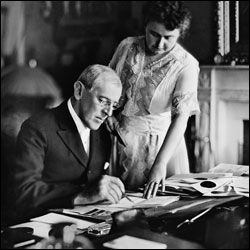 "Madam President" Edith Wilson (1872–1961). |
|

Joseph Patrick Tumulty (1879–1954)
was Wilson's private secretary. |
To bolster public support for his League of Nations, Wilson barnstormed the Western states. In October 1919 he suffered a stroke which left him partially paralyzed.
Wilson had a very competent Vice President named Thomas Marshall Riley, but he was completely ignored, while "Madam President," Tumulty, and House ran the White House.
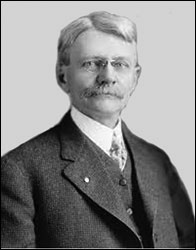 Thomas Riley Marshall (1854–1925). Vice President from 1913 to 1921. |
|
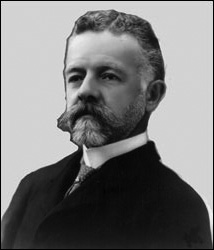 Henry Cabot Lodge (1864–1928). Senator from 1893 to 1924. |
Amazingly, during that critical time, General Marlborough Churchill was still intensely involved in espionage against the New Jerusalem:
Both May Ladenburg and Bernard Baruch, humiliated by the charges of spying, embarked on campaigns to salvage their reputations. Their forays were made separately and at the highest levels of authority. Through Baruch's influence—which is to say, access to Edith Wilson, Admiral Grayson, and therefore the president—Ladenburg was able to approach Brigadier General Marlborough Churchill and Secretary of State Newton Baker (Levin, Edith and Woodrow, pp. 408-409).
Pamela Digby Churchill Hayward Harriman Hillary Clinton was born the same year that General Marlborough Churchill went to "Purgatory."
President Thirteen is buried in the National Cathedral in Washington City!!
Wilson loved to be chauffeur driven around Washington City in his Rolls Royce. Incredibly, "Comrade" Vladimir Lenin—his counterpart in Moscow— also had his chauffeur driven Rolls Royce.
 Wilson and Edith out for a drive in their Rolls Royce. Wilson and Edith out for a drive in their Rolls Royce. |
|
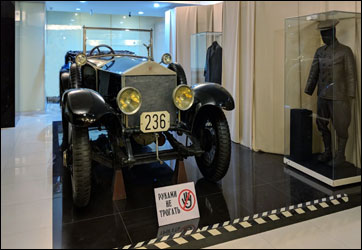 Vladimir's Lenin's Rolls Royce is on display at Vladimir's Lenin's Rolls Royce is on display atthe State Historical Museum in Moscow. |
Washington National Cathedral is modeled on Westminster Abbey where the Tudor double and Mary Queen of Scots are buried. It is owned by the Episcopal Church which is the U.S. twin of the Anglican Church....An Episcopalian is a Catholic who can't speak Latin!
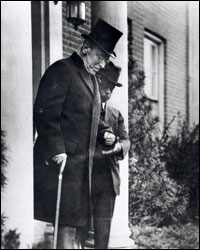 Woodrow Wilson in 1923. The real "Tommy" Wilson would have been 67. |
|
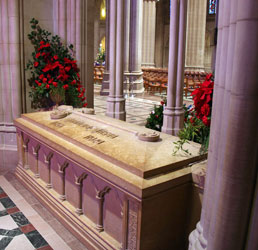 Woodrow Wilson's tomb in Washington National Cathedral. Woodrow Wilson's tomb in Washington National Cathedral. |
There is no doubt that Wilson was a "mighty man," but the Prophet Zephaniah predicted that the "mighty man" will cry bitterly on the Last Day:
The great day of JEHOVAH is near, it is near and comes quickly, even the voice of the day of JEHOVAH, the mighty man shall cry there bitterly (Zephaniah 1:14).
Mighty man Wolfson was the godfather of Princeton University, which has a stranglehold on the "educational system" in use throughout the country. He signed into law the "Federal" Reserve Act which gave US the income tax and the fiat paper money system!
By delaying the U.S. intervention in WWI he almost ensured a Second Reich victory. The rejected League of Nations Treaty provided the blueprint for the New Jerusalem involvement with the UN and NATO (North Atlantic Terrorist Organization).
References.
Berg, Scott A. Wilson. G.P. Putnam's Sons. New York, 2013.
Blum, John M. Tumulty and the Wilson Era. Houghton Mifflin Company, Boston, 1951.
Coffman, Edward M. The Hilt of the Sword: The Career of Peyton C. March. University of Wisconsin Press, Madison, Wisconsin, 1966.
Cooper, John Milton, Jr. Woodrow Wilson: A Biography. Alfred A. Knoph. New York, 2009.
Graves, William S. America's Siberian Adventure (1918–1920). J. Cape & H. Smith, 1931. Kindle 2018 Edition.
Hodgson, Godfrey. Woodrow Wilson's Right Hand Man: The Life of Colonel Edward House. Yale University Press, New Haven, 2006.
Kahn, David. The Reader of Gentlemen's Mail: Herbert O. Yardley and Birth of American Codebreaking. Yale University Press, New Haven, 2004.
Levin, Phyllis Lee. Edith and Woodrow: The Wilson White House. Simon & Schuster, New York, 2001.
Lodge, Henry Cabot. The Senate and the League of Nations. Charles Scribener's Sons, New York, 1925.
Nelson, James Carl. The Polar Bear Expedition. William Morrow, New York, 2019.
Singh, Simon. The Code Book: The Evolution of Secrecy from Mary Queen of Scots to Quantum Cryptography. Doubleday, New York, 1999.
Yardley, Herbert O. The American Black Chamber. Naval Institute Press, Annapolis, Maryland. 1931.
White, William Allen. Woodrow Wilson: The Man, His Times, and His Task. Houghton Mifflin Company. Boston, 1924.
Copyright © 2022 by Patrick Scrivener